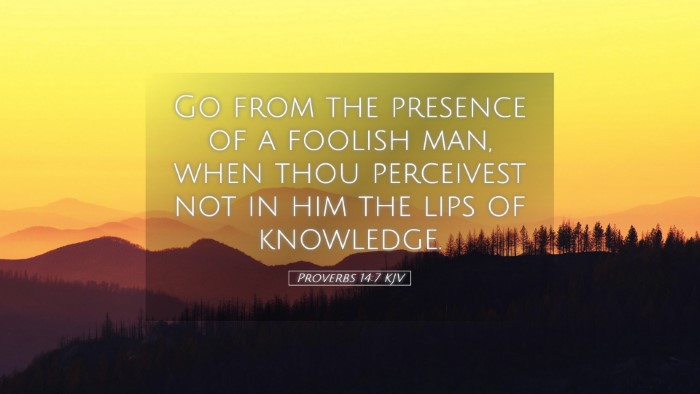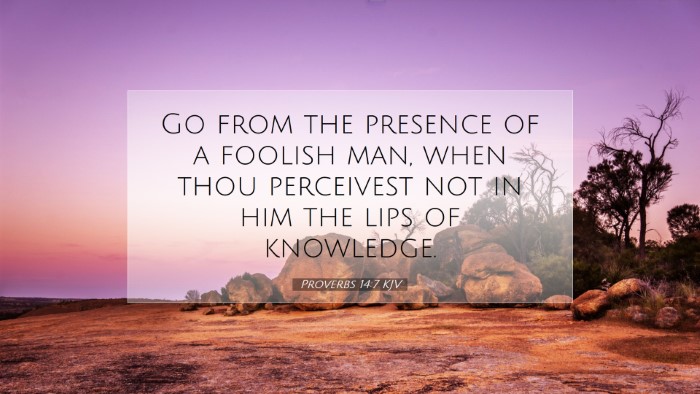Commentary on Proverbs 14:7
Bible Verse: "Go from the presence of a foolish man, when thou perceivest not in him the lips of knowledge."
Overview
The book of Proverbs offers wisdom and guidance, particularly concerning the contrast between the wise and the foolish. Proverbs 14:7 serves as an imperative instruction regarding associations and conversations with those lacking understanding. Various public domain commentaries shed light on this verse, emphasizing the importance of discernment and the avoidance of foolishness in our dealings with others.
Interpretative Insights
-
Matthew Henry:
Henry emphasizes the need for discernment in choosing one's companions. He suggests that one should distance themselves from a foolish man, particularly when it becomes evident that his words lack wisdom and knowledge. The presence of such individuals can lead to confusion and misunderstanding, ultimately impacting one's own spiritual and moral standing.
-
Albert Barnes:
Barnes notes that the term "foolish man" refers not only to a person who lacks wisdom but can also indicate one who is hardened and obstinate in folly. The commandment to leave their company suggests an active choice to seek wisdom instead of listening to empty words that can lead to spiritual peril. Barnes suggests that wisdom often requires a separation from those who refuse to listen to sound instruction.
-
Adam Clarke:
Clarke provides a detailed exploration of the word "knowledge" in this context. He argues that being in the presence of a foolish man can dull the mind's capacity for wisdom, thus urging believers to be aware of the influences surrounding them. Clarke highlights the importance of being in environments that foster growth and understanding rather than those that encourage the opposite.
Theological Implications
This verse underscores a fundamental Christian principle: the necessity of wisdom in our relationships. The teachings of Proverbs frequently affirm the idea that one's character can significantly affect another's spiritual life. Associating with those lacking discernment, knowledge, or sound doctrine can sway believers away from righteousness.
Wisdom and Association
It is biblically established that relationships are formative. As Thompson notes in his insights on Proverbs, "bad company corrupts good character" (1 Corinthians 15:33). Thus, it becomes vital for believers to recognize the potential dangers in continuing close fellowship with those whose perspective diverges from scriptural truth.
Call to Discernment
The call to "go from the presence of a foolish man" is not only a social guideline but also a spiritual directive. Pastors and theologians often remind congregations that discernment is a gift of the Spirit. This verse serves as a call to actively seek counsel from those who possess true wisdom while simultaneously stepping away from influences that may lead to spiritual detriment.
Practical Applications
- Evaluate Relationships:
Believers should regularly assess their friendships and associations. Are these relationships edifying and supportive of their spiritual journey?
- Seek Wise Counsel:
In times of decision-making, it is imperative to turn to those who are known for their wisdom and understanding, as exemplified in Proverbs 11:14.
- Avoiding Foolishness:
This verse prompts individuals to avoid engaging in debates or discussions that are rooted in foolishness. Time and energy are better spent cultivating understanding and learning from wise individuals.
Conclusion
Proverbs 14:7 serves as a profound reminder for followers of Christ to remain vigilant in their associations and conversations. Drawing from Matthew Henry, Albert Barnes, and Adam Clarke, it is evident that this verse not only instructs believers to distance themselves from foolishness but also calls them into a deeper understanding of the importance of wisdom in all aspects of life. As scholars, theologians, and pastors, the challenge remains to discern wisely and associate with those who promote a deeper understanding of God's truth.


